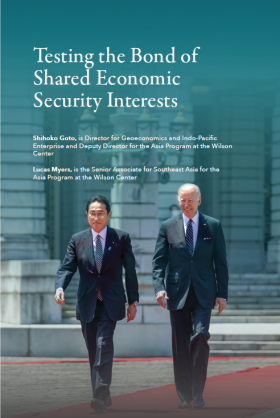Testing the Bond of Shared Economic Security Interests


Excerpted from "Reshaping US-Japan Economic Security Partnership in the Indo-Pacific," Shihoko Goto and Lucas Myers explore US-Japan economic security interests and paths forward for expanded partnership.
Following pandemic-era disruptions and China’s economic coercion, the United States and Japan have embraced “economic security,” the merging of economics into national security. This has opened up a new era in the US-Japan alliance, expanding options for collaboration on economic issues that previously divided the two countries. Both countries rapidly identified resilient supply chains and enhancing trust as key objectives of their increasingly collaborative economic
security policies.
However, some differences continue to challenge cooperation. For one, the US disfavor of trade agreements arguably hinders its ability to compete against China. Secondly, Japanese policymakers and corporations are concerned that US protectionist economic policies could harm Japanese investments in the United States. Thirdly, a disconnect on the extent of derisking from China could prove a stubborn impasse over time, with Japan remaining less willing to decouple from the Chinese market in key sectors.
Yet, the overall alliance is arguably the healthiest it has been in decades. Undergirded by mutual interests in economic security, the United States and Japan are well-positioned to expand their cooperation in the Indo-Pacific to anchor, secure, and stabilize the world’s fastest growing region around a free and open economic
order.
Authors



Indo-Pacific Program
The Indo-Pacific Program promotes policy debate and intellectual discussions on US interests in the Asia-Pacific as well as political, economic, security, and social issues relating to the world’s most populous and economically dynamic region. Read more

Explore More
Browse Insights & Analysis
360° View of How Southeast Asia Can Attract More FDI in Chips and AI


